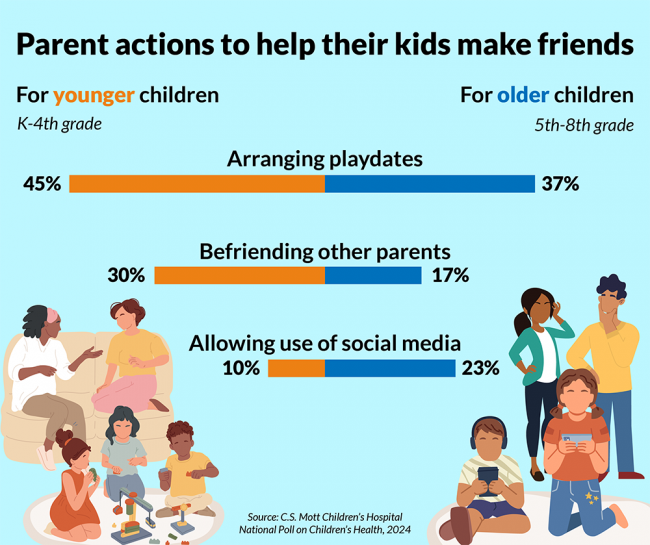Facilitating friendships: Parents' role


Facilitating friendships: Parents' role
Friendships help children build social skills and can make school more enjoyable. The start of the school year is a chance to make new friends. The C.S. Mott Children’s Hospital National Poll on Children’s Health asked a national sample of parents of children 6-12 years old about their perspectives on making new friends.
Nearly 1 in 5 parents (19%) say their child has no friends or not enough friends, while 90% say their child would like to make new friends. Over half of parents (52%) report at least one factor that makes it difficult for their child to make new friends, including their child being shy or socially awkward (21%), kids having no time (18%) or too few places (16%) to play or get together, other kids already having friend groups (17%) or being mean (15%), and the child’s disability or medical condition (7%) or appearance (3%). Parents of older children (5th-8th grade) are more likely than parents of younger children (kindergarten-4th grade) to say that difficulties making new friends are related to other kids already having friend groups (21% vs 13%) and kids having too few places to get together (20% vs 14%).
Most parents (71%) describe taking action in the past year to help their child make new friends. Their strategies include arranging play dates or outings (41%), enrolling their child in activities to meet kids with similar interests (40%), giving their child advice on how to make friends (33%), trying to befriend other parents who have kids the same age (24%), allowing their child to use social media to connect with friends (16%), and buying items to help their child “fit in” with other kids (10%). Parents of younger children (K-4th grade) are more likely than parents of older children (5th-8th grade) to arrange play dates (45% vs 37%) and befriend other parents (30% vs 17%), while parents of older children are more likely to allow the use of social media (23% vs 10%) and buy items to fit in (13% vs 9%).
Over half of parents (59%) feel it is very important that they know the parents of their child’s friends, while 29% are very concerned about their child’s friends encouraging their child to do things parents don’t approve of. Nearly two-thirds of parents (63%), with no difference by grade level, say it is important that their child’s friends come from families similar to theirs, related to parenting style (81%), religious or political views (36%), parent level of education (12%) or family income (5%).

Highlights
- 1 in 5 parents say their child age 6-12 years has no friends or not enough friends.
- 3 in 4 parents have taken steps to help their child make new friends.
- 2 in 3 parents say it is important that their child’s friends come from families similar to theirs.
Implications
Friendship is an important part of childhood. Having and being a friend helps children develop social skills and enhances their self-esteem. Having friends at school makes the school day more enjoyable and has been linked to improved school performance. However, in this Mott Poll, 1 in 5 parents reported that their child has no friends or has not enough friends; these children may feel isolated and lonely which impacts their quality of life and mental health.
Nearly all parents said their child would like to make new friends, and most parents indicated that they have tried to boost their child’s friend-making efforts. Children are still developing their social skills, and they practice these skills while making and maintaining friendships. Parents should expect children to make mistakes and be ready to listen and offer advice when misunderstandings occur. It is important for parents to remember that developing social skills will take years and that making mistakes can be valuable learning experiences.
For some children, making new friends can be stressful. Some parents noted that their child being shy or socially awkward impeded their efforts to make new friends, while others pointed to their child’s disability or medical condition as a barrier. Parents might help their child to ease into friend-making by finding a small-group activity their child enjoys, thus creating an opportunity to connect with peers but without pressure to make friends.
For children in elementary school (K-4), friendships often begin as a matter of proximity; kids play with whoever is around. Parents in this Mott Poll described facilitating these early interactions by befriending other parents and arranging playdates and outings, often with one or more parents present. However, parents should be deliberate in giving children space to interact and work through decisions and conflicts, intervening only for matters of safety. Children learn important social skills when they negotiate what and how they play.
As they enter middle school, children often want to have more independence with their friends. Although they may need parents to coordinate schedules and transportation, middle schoolers often want to hang out with friends without parents physically present. A challenge to this can be a lack of places for kids to get together; in some communities, public spaces such as malls and libraries have banned children who are not accompanied by a parent. Thus, to support their middle-schoolers’ burgeoning independence, parents may help brainstorm potential meeting places, and emphasize the need for appropriate behavior to ensure that kids will continue to be welcomed.
One in four parents of middle school-aged children said they allow greater use of social media to help their children make friends. This should be considered carefully, as social media has been shown to increase the risk of developing mental health concerns such as anxiety and depression due to the opportunities for negative peer influences. Parents who choose to allow social media should help their child learn to use it responsibly.
An unexpected finding in this Mott Poll is the large proportion of parents who think it is important that their child’s friends come from families similar to their own. Most commonly, this involved similar parenting styles, which could reflect things like how permissive the parents are around following family rules, and other aspects of parenting. Other parents indicated a preference for their child’s friends to come from families with a certain political or religious affiliation. Parents should be cautious about this approach. School is often viewed as a place where children will encounter and form connections with others who may differ from them in many ways. Limiting a child’s friends to only those from similar backgrounds may hamper the child’s ability and comfort in navigating diverse networks and working with a broad group of peers in the future.

Data Source & Methods
This report presents findings from a nationally representative household survey conducted exclusively by Ipsos Public Affairs, LLC (Ipsos) for C.S. Mott Children’s Hospital. The survey was administered in August 2024 to a randomly selected, stratified group of adults who were parents of at least one child age 1-17 years living in their household (n=2,010). Adults were selected from Ipsos’s web-enabled KnowledgePanel® that closely resembles the U.S. population. The sample was subsequently weighted to reflect population figures from the Census Bureau. The survey completion rate was 67% among panel members contacted to participate. This report is based on responses from 1,031 parents with at least one child age 6-12. The margin of error for results presented in this report is ±1 to 5 percentage points.
Findings from the C.S. Mott Children’s Hospital National Poll on Children’s Health do not represent the opinions of the University of Michigan. The University of Michigan reserves all rights over this material.
Citation
Clark SJ, Gebremariam A, Schultz SL, Woolford SJ. Facilitating friendships: Parents' role. C.S. Mott Children's Hospital National Poll on Children's Health, University of Michigan. Vol 46, Issue 1, September 2024. Available at: https://mottpoll.org/reports/facilitating-friendships-parents-role.

